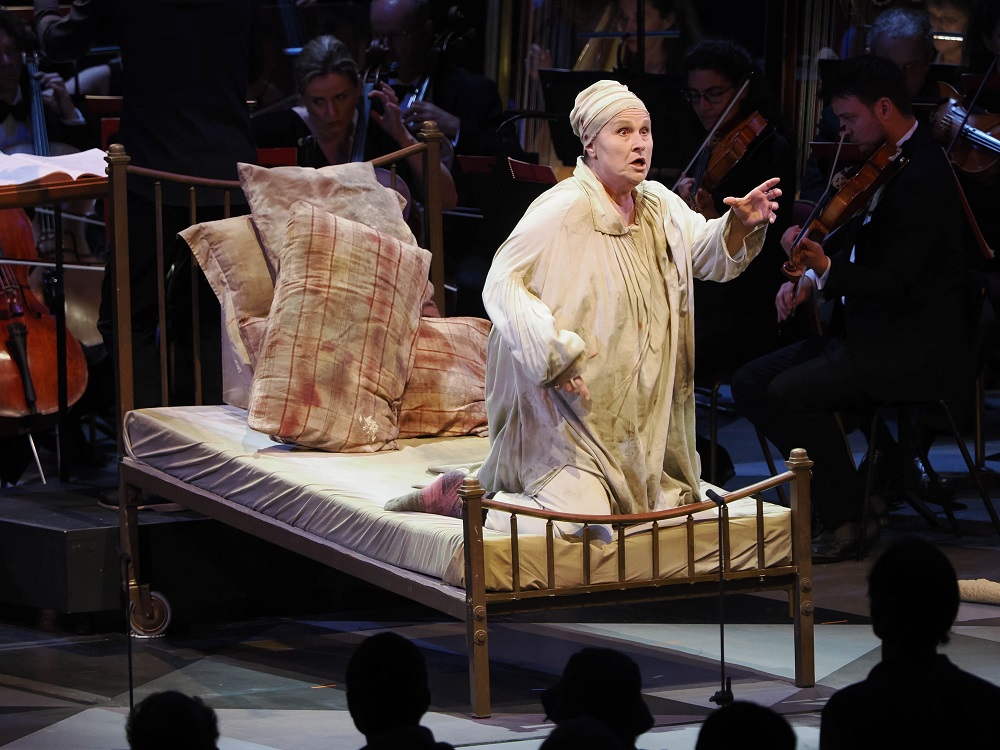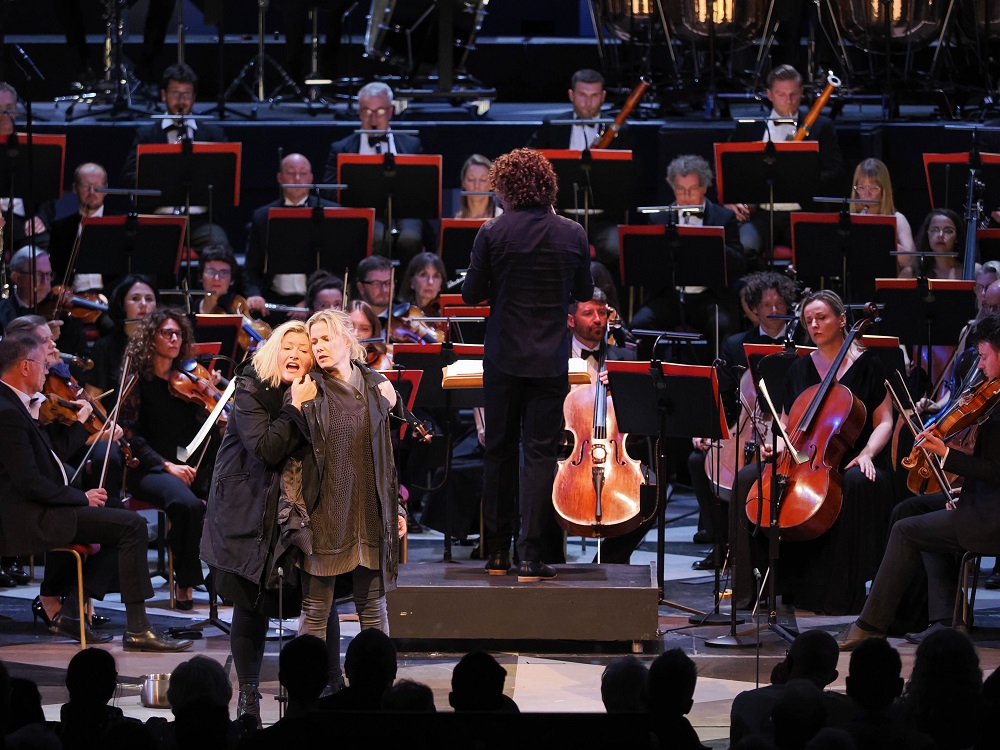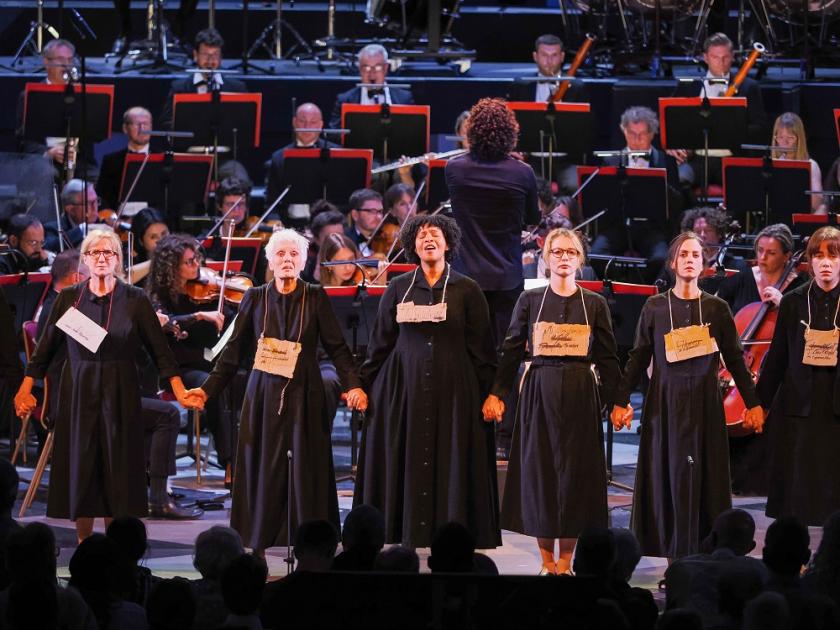“There will be more incense,” promised Glyndebourne Music Director Robin Ticciati of the company’s annual visit to the Proms. He was talking to my Opera Zoom class between the final rehearsal and first performance of Poulenc’s great masterpiece about the martyrdom of Carmelite nuns during the French revolution, as directed by Barrie Kosky with unsparing horror and humanity. And now here was the operatic company of the year taking its final bow after a sellout run in Sussex.
Ticciati was right: during earlier scenes in the convent, the hallowed atmosphere in the Albert Hall was such that over the airwaves you could have heard a pin drop in the many silences Kosky and his conductor had stretched to breaking point. Yet from the point where the revolutionary mob breaks into the sanctuary, the drama was hair-raising, too, seemingly having lost none of its dreadful power.
All the more remarkable, perhaps, that this concert staging supervised by Donna Stirrup came across on BBC Radio 3. theartsdesk brings you live coverage of many Proms, but in this case the spirit was ever so willing to be there, but the post-operation flesh too weak to sit/stand through a three-hour opera. It was a one-off experiment worth making. Admittedly I’d seen the first night, and been haunted by it ever since. Score and libretto at home were essential; I’d recommend anyone yet to listen to make sure an English translation is at hand. I’m glad there were supertitles in the hall – the Proms have been taken to task for not providing them in the case of a work as wordy as Janacek’s The Makropoulos Case, where half the audience hadn’t bought a programme. Here the beauty of George Bernanos’ text with its multiple takes on faith and fear has to be perfectly understood.  The different voice-types of this miraculous cast stood out in even bolder relief on the radio. Katarina Dalayman as the first Prioress (pictured above), who has what young Constance calls “the wrong death” in blaspheming agony, cut an awesome vocal figure, all the stronger without the excessively ugly makeup (one of the few points in which I felt Kosky went too far). Sally Matthews as fearful Blanche sounds more impressive live, but the increasing intensity leapt out: the blisteringly delivered scene where Mother Marie (the stunning Karen Cargill) comes to seek her when she’s fled the convent had an impact equal to the staging (Cargill and Matthews pictured below) . If perhaps you wouldn’t be so aware that Florie Valiquette's Constance was characterized as another character on the edge, her radiant lyricism came across, parallel with the more down-to-earth loveliness of Golda Schultz’s second Prioress (the new energy when she arrives was palpable, as at Glyndebourne).
The different voice-types of this miraculous cast stood out in even bolder relief on the radio. Katarina Dalayman as the first Prioress (pictured above), who has what young Constance calls “the wrong death” in blaspheming agony, cut an awesome vocal figure, all the stronger without the excessively ugly makeup (one of the few points in which I felt Kosky went too far). Sally Matthews as fearful Blanche sounds more impressive live, but the increasing intensity leapt out: the blisteringly delivered scene where Mother Marie (the stunning Karen Cargill) comes to seek her when she’s fled the convent had an impact equal to the staging (Cargill and Matthews pictured below) . If perhaps you wouldn’t be so aware that Florie Valiquette's Constance was characterized as another character on the edge, her radiant lyricism came across, parallel with the more down-to-earth loveliness of Golda Schultz’s second Prioress (the new energy when she arrives was palpable, as at Glyndebourne).
There was time to reflect on the strong tones of the revolutionaries in the later stages, above all Gavan Ring’s First Commissary and Theodore Platt’s Jailer (I’m atoning her for guilt at having omitted their names from the original review). Also impressive that no less than five soloists were drawn from the Glyndebourne Chorus, that pillar of excellent promise.  Radio 3 sound from the Proms just seems to get better every year. Conducting an incandescent London Philharmonic Orchestra, Ticciati’s painstaking way with the change of colours Poulenc achieves within bars, sometimes even within a phrase or repeated phrase, registered hauntingly. The march to the scaffold and the “Salve regina”, more fast-paced than usual – and with proper guillotine-drop, since Kosky’s horrifying solution couldn’t be done here – brought all the necessary goosebumps and tears. This has been such a labour of love, from the first rehearsal when conductor, director and singers all gathered together. No doubt it will be back at Glyndebourne; but meanwhile, how marvellous that we have this recorded document.
Radio 3 sound from the Proms just seems to get better every year. Conducting an incandescent London Philharmonic Orchestra, Ticciati’s painstaking way with the change of colours Poulenc achieves within bars, sometimes even within a phrase or repeated phrase, registered hauntingly. The march to the scaffold and the “Salve regina”, more fast-paced than usual – and with proper guillotine-drop, since Kosky’s horrifying solution couldn’t be done here – brought all the necessary goosebumps and tears. This has been such a labour of love, from the first rehearsal when conductor, director and singers all gathered together. No doubt it will be back at Glyndebourne; but meanwhile, how marvellous that we have this recorded document.















Add comment